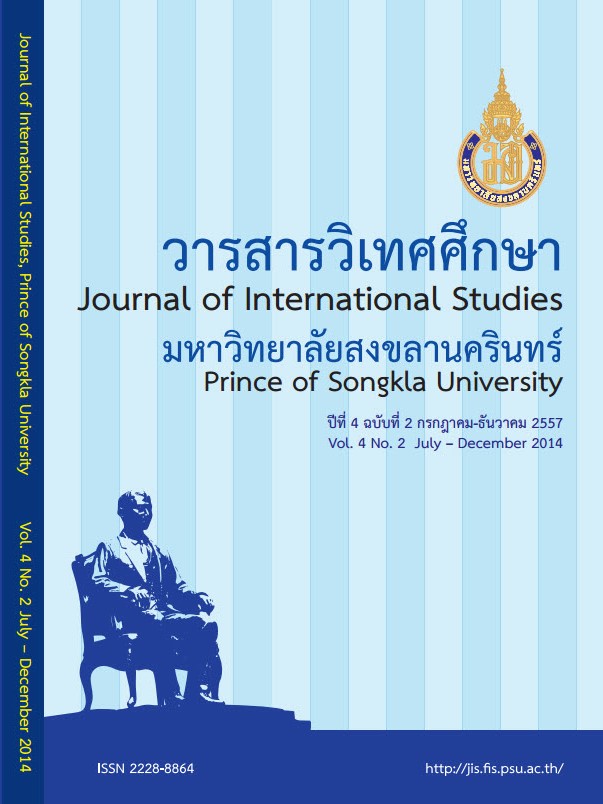Thematic Progression in Tai Dam Ritual Procedural Texts
Main Article Content
Abstract
This study draws on a framework of Functional Sentence Perspective (FSP) which was developed by Daneš (1974). Tai Dam ritual procedural texts were analyzed within a scope of thematic progression. The objective of this study is to study thematic progression in Tai Dam ritual procedural texts. Nine texts were collected from Tai Dam ritual masters.
The results revealed that there are three patterns of thematic progression found in Tai Dam ritual procedural texts: (1) constant thematic progression (70.6%), (2) simple linear thematic progression (29.2%) and (3) split Rheme pattern (0.2%). Primarily, the selected texts are developed by the selection of Process Theme (or action verb) which plays significant role in ritual meaning.
Article Details
Statements and opinions expressed in articles herein are those of the authors and do not necessarily reflect the position of the editors or publisher.
Article, information, text, image, etc. which are published in Journal of International Studies, belong to Journal of International Studies. If anybody or any organization would like to use part or whole of them, they must receive written permission from Journal of International Studies before usage.
References
[The phonemic system of Thai Dam dialect Muban Napanat, Tambon Khao Kaeo, Amphoe Chiang Khan, Loei province](Master's thesis). Srinakharinwirot University, Bangkok.
Buranasingha, A. (1988). Wikro Kan Plienplaeng Kan Chai Kam Khong Kon Sam Radap Aju Naj Phasa Thai Song. [An analysis of lexical change among three generations in Thai song dialect] (Master's thesis) Mahidol University, Nakhorn Pathom.
Burusphat, S. (1997). Saranukrom Klum Charttipan Naj Prathet Thai: Thai Song. [Encyclopedia of Ethnic Gruops in Thailand: Thai Song]. Sahadhammic Bangkok Press.
Burusphat, S., et. al (2011). Language Vitality and the Ethnic Tourism Development of the Lao Ethnic Groups in the Western Region of Thailand. Journal of Lao Studies, 2(2), 23-46.
Burusphat, S. (2012). Tones of Tai Song varieties. The Journal of Southeast Asian Linguistics (JSEALS), 5, p. 1-17.
Chamberlain, James R. (1975). A new look at the history and classification of the Tai dialects. In J. G. Harris and J. R. Chamberlain (Eds) Studies in Tai Linguistics in Honor of William J. Gedney. (pp. 49-60). Bangkok: Central Institute of English Language, Office of State Universities.
Daneš, F. (1974). Functional sentence perspective and the organisation of the text. In F. Daneš (Ed.), Papers on Functional Sentence Perspective. (pp. 106-128). The Hague: Mouton.
Decha, W. (1987) Suksa Prieptiep Rabob Siang Phasa Thai Hok Phasa Thi Phoot Naj Amphoe Thatako Nakhornsawan. [A comparative study of phonological systems of 6 Thai languages spoken in Thatako district, Nakhornsawan province](Master's thesis) Chulalongkorn University, Bangkok.
Edwards, A. T. (2011). Participant reference in Tai Dam narrative discourse (Master's thesis). Payap University, Chiang Mai.
Fries, Peter H. (1995). A personal view of Theme. In M. Ghadessy (Ed.), Thematic development in English texts. (pp. 1-19).
Amsterdam: John Benjamins.
Halliday, M. A. K., and Matthiessen, M. I. M. C. (2004). An introdution to functional grammar. (3rd ed.). New York: Oxford University Press Inc.
Halliday, M. A. K. & McDonald, E. (2004). Metafunctional profile of Chinese. In Caffarel, Alice, James R. Martin and Christian M.I.M. Matthiessen (Eds.), Language typology: a functional perspective. (pp. 305-396). Amsterdam: John Benjamins.
Hartmann, John F. (1980). A model for alignment of dialects in Southwestern Tai. Journal of Siam Society, 68, 72-86.
Hartmann, J. (1994). Pronominal strategies in Tai Dam peotic discourse. In K.l. Adam and T.J. Hudak (Ed.), Paper from the
secound Annual Meeting of the Southeast Asian Linguistic Society. (pp. 187-199). Arizona State University, Program for
Southeast Asian Studies.
Jiranuntanaporn, S. (2003). Rajngan Kan Wicaj Ruang: Rabob Wajjakorn Naj Phasa Thai Song. [Research report: grammatical system of Thai Song in Phitsanulok province] Naresuan University, Phitsanulok.
Li, F K. 1960. A tentative classification of Tai dialects. In S. Diamond, (Ed.) Culture in history: Essays in honor of Paul Radin. (pp. 951-959). New York: Columbia University Press.
Loos, E. (2003). What is procedural discourse? [Online] In SIL International. Retrieved September 25, 2011 from http://
www.sil.org/acpub/repository/15857.pdf.
Martin, J. R. and Rose, D. (2008) Procedures and procedural recounts. Genre Relations: Mapping Culture. London and
Oakville: Equinox.
Matthiessen, C M.I.M. (1995a). Lexicogrammatical cartography: English systems. Tokyo: International Language Sciences
Publishers.
Matthiessen, C M.I.M. & Halliday, M.A.K. (2009). Systemic Functional Grammar: a First Step Into the Theory in English and
Chinese. Higher Education Press.
Paltridge, B. (2000). Making Sense of Discourse Analysis. Gold Coast, Queensland: Antipodean Educational Enterprises.
Reviewed in EA Journal.
Panich, A. (1994). Kamlongthaj Naj Phasa Lao Song. [Final particles in Lao Song] (Master's thesis). Mahidol University, Nakhorn Pathom.
Patpong, P. (2006). A systemic functional interpretation of Thai grammar: an exploration of Thai narrative discourse.
(PhD thesis). Macquarie University.
Patpong, P. (2011a). A Genneric Structure Potential Analysis of Thai Song Dam Folktales. Paper presented at the 21th, Annual Conference of Southeast Asian Linguistics Society, Kasetsart University, May11-13, 2011.
Patpong, P. (2011b). Textual resourse of Thai Song Dam Folktales. Paper presented at the 11th, International
Conference on Thai studies, The Siam city Bangkok, July 26-28, 2011.
Suebsuk, R., Suksaman, Y. & Rachadapan, S. (1980). Wannakam Phunban Thai Song Dam Amphoe Khawyoi Phetchaburi.
[The verbal folk literature of Thai Song dam Amphur Khaoyoy, Phetchaburi province] Faculty of humanities and social sciences, Phetchaburi Teacher's college, Phetchaburi.
Wattanaprasert, K. & Liamprawat, S. (1988). Rajngan Kan Wijai Rueng Rabob Sieng Phasa Lao Khong Lum Mae Nam Thajean. [Research report on phonological system of Lao dialects in Thachin river basin] Silpakorn University, Nakhorn
Pathom.
Yensamut, P. (1981). Kham Lae Khammaj Naj Phasa Lao Song. [Word and meaning of Laos Song] Master's thesis). Silpakorn University, Nakhorn Pathom.


